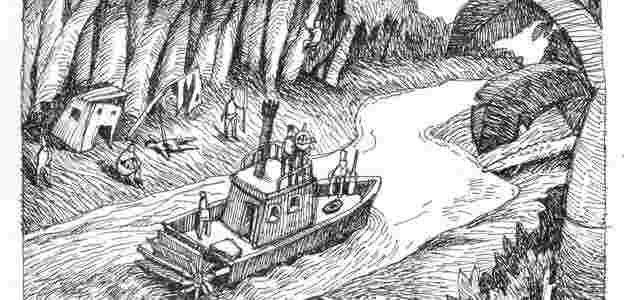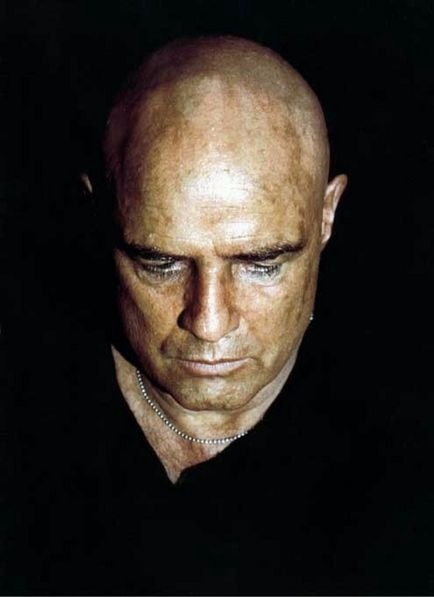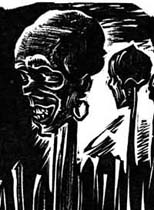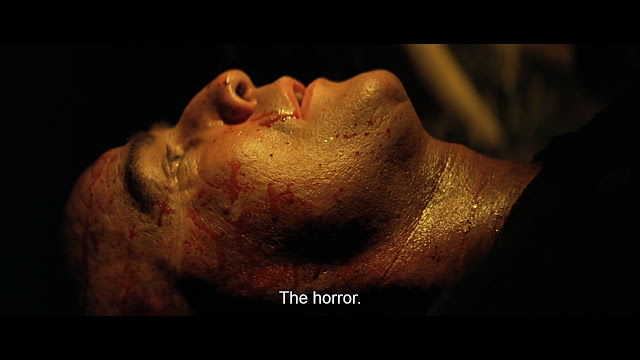Heart of Darkness: The Two-Sided Mask of Kurtz
Well-known American novelist Nathaniel Hawthorne once said “No man, for any considerable period, can wear one face to himself, and another to the multitude, without finally getting bewildered as to which may be true” (“Quotes about Masks”). This quote relates to how in society everyone must be able to show an attitude, a facade, something that makes them acceptable to society. But even when trying to show what makes a person acceptable in society, they must also hide something or wear a mask over their true self. However, there does come a time when those who continue to hide themselves, can no longer differentiate between the mask and what lies behind it. This can be known as the creation of a persona.
What is a persona?
The persona was first introduced by Swiss psychiatrist Carl Jung, who defined the persona as “a kind of mask designed on the one hand to make a definite impression upon others, and on the other to conceal the true nature of the individual” (“Persona (psychology)”). The term “persona” can be best linked in today’s society as character roles that are played by an actor. The word is derived from the Latin term of the same name which referred to the masks worn by Etruscan mimes (“Persona”).

In Joseph Conrad’s 1902 English novella, Heart of Darkness, a character by the name of Mr. Kurtz demonstrates an internal battle between that of the good and evil within himself, using the ideals of morals and alienation. In this novella that focuses on the human psyche, the reader explores Kurtz’s transformation in three consecutive chapters: the darkness foreshadows itself in part one, describes its footpath in the second part, and finally presents itself in part three. The reason for the mystery behind Kurtz lies in the multiple masks and personas that he commonly wears throughout the story and wondering as to which of his personas is his true personality.
In terms of literature, the reader can see Kurtz, most simply, as he resembles the archetypal “evil genius”, the highly gifted but ultimately degenerate individual whose fall is the stuff of legends. Some other examples in literature of characters having a similar mindset to that of Kurtz being Faust from Paradise Lost, Dorian Gray from The Picture of Dorian Gray, and Heathcliff from Wuthering Heights. “Like these characters, he is significant both for his style and eloquence and for his grandiose, almost megalomaniacal scheming. In a world of mundanely malicious men and ‘flabby devils’ attracting enough attention to be worthy of damnation is indeed something” (“Heart of Darkness- Kurtz Analysis”).
Who is Kurtz?

Now to get into the depths of Kurtz, we must first understand who Kurtz is. Kurtz is an ivory trader, sent by a shadowy Belgian company into the heart of an unnamed place in Africa. With the help of his superior technology, Kurtz has turned himself into a charismatic demigod of all the tribes surrounding his station, and gathered vast quantities of ivory in this way. As a result, his name is known throughout the region. Kurtz’s general manager is jealous of Kurtz, and plots his downfall.
Kurtz’s mother was half-English, while his father was half-French, and thus it is considered that all Europe contributed to the making of Kurtz. Everyone who knows Kurtz (even his fiancée) agrees that Kurtz has all of the potential ambition, charisma, and eloquence to achieve greatness. Kurtz is even known to be a multitalented man being known for his skills as a painter, musician, writer, and a promising politician – the chief of which are his charisma and his ability to lead men.
He starts out, years before the novel begins, as an imperialist in the best tradition of the “white man’s burden.” The reader is introduced to a painting of Kurtz’s, depicting a blindfolded woman bearing a torch against a nearly black background, and clearly symbolic of his former views. Kurtz is also the author of a pamphlet regarding the civilization of the natives. Kurtz is a man who understands the power of his own words, and his writings are “marked by an eloquence that obscures their horrifying message” (“Heart of Darkness- Character Bios”).
At the time the novella was written, Europe had established territories across the map. It holds true to the concept of “power corrupts and absolute power corrupts absolutely.” This becomes especially true when the power in question, is the power to reign over the fate of a large group of humans within a society. The main theme of “darkness” takes center stage, as majority of its importance when Marlow encounters his idol, Kurtz.
The Transformation Within Kurtz
As previously mentioned, Kurtz has been known to clearly exercise a powerful influence on the people in his life. In the story, Kurtz represents a normal—if motivated—man who realizes that he has to flourish in the Interior of the Congo. He must use his skills in creating a persona, a mask, that would make the people see him as a superior being, someone who can act as a divine ruler over these “primitive” people and bring them towards the proverbial light and development.
However, could it be said that the way in which Kurtz manipulates people to his will and his image as that of divinity is actually a façade? It is this power and persona that takes over as Kurtz considers himself to be that of god-like image and perfection. Basically, Kurtz’s philosophy on this and the use of his persona can be considered “If you can’t beat them, join the attitude.”
In another point of view, Kurtz can be seen as “hollow.” Indeed, Kurtz is not so much a fully realized individual as he is a series of images, constructed by others for their own use or something for them to believe in. After Marlow hears from a sick man about Kurtz being a “remarkable man” (Conrad 307), Marlow continues to slowly gain interest in the mysterious man known as Kurtz. As Marlow’s visits with Kurtz’s cousin, the Belgian journalist, and Kurtz’s betrothed demonstrated in their varied statements, there seems to be no true Kurtz. To his cousin, he was a great musician; to the journalist, a wonderful politician and leader of men; even to his fiancée, who claimed to “know him best” (Conrad 352), he is considered a great humanitarian and prodigy. All of these showing clear distinctions especially compared with Marlow’s version of the man, and thus he is left doubting the validity of his own memories. While in truth, it is that Kurtz has simply shown each of these people a different mask and persona as if it were perfectly and specifically crafted for each respective individual.
In the article, “Exploring Madness in Conrad’s Heart of Darkness and Lawrence’s Women in Love” by Marina A. Kinney, Kinney describes the deep psychological properties of characters within the two works, Heart of Darkness and Women in Love by D.H. Lawrence and analyses the source of these madness and how they are perceived by the reader. Marina goes on to talk about Kurtz by stating “While Kurtz’s mind has given way to delusions of grandeur, he continues to be regarded as an exceptional man. While he possesses potential, his capacity for “greatness” is not achieved with the Company as his colleagues predicted. Rather, his distinction emerges as his madness manifests itself within the African wilderness” (“Exploring Madness in Conrad’s Heart of Darkness and Lawrence’s Women in Love”). This quote basically states how Kurtz’ ability to adapt his persona is more focused on being used towards whatever he feels might benefit himself as a vessel more than as a person. Kurtz’s plan for “greatness” and his persona are both easily adapted from being the hero of the Company to being the divine being of an African tribe.
Unlike the other characters in the story, Kurtz views the natives as far more than instruments to be used for the purpose of work. Instead, Kurtz sees something far beyond that, as he uses their humanity to advance himself. Because of this, Kurtz’ corrupt persona became more and more considered to be his own “true self” as he believed that he has become far more enlightened through his corruption and his ultimate claim towards being that of divinity, thus losing his own original identity. The inner modification that Kurtz’s personality goes through is best described by article writer, Suzanne Fields, as “The fictional hero was himself, larger than life, moving from idealism — from believing he was a civilizing force — to descending into the darkness of his own making in a carnival of barbarity” (“RealClearPolitics – Articles – Heart of Darkness”).

Marlow makes sure to inform his listeners that, although the man’s intelligence is clear, Kurtz’s inner essence and personality has become twisted. Kurtz’s madness can be displayed in many ways as Marlow observes him in the Congo. One of the most notable signs of Kurtz’s corrupt power is demonstrated by the impaled heads on sticks that led to Kurtz’s home.
Marlow describes his experience with the scene “Then I went carefully from post to post with my glass, and I saw my mistake. These round knobs were not ornamental but symbolic; they were expressive and puzzling, striking and disturbing- food for thought and also for vultures if there had been any looking down from the sky; but at all event for such ants were industrious enough to ascend the pole. They would have been more impressive, those heads on the stakes, if their faces had not been turned to the house.” (Conrad 338) The impaled heads being of those that defiled Kurtz’s divinity. It could even be said that Kurtz’s mind has even become as rotten as the decapitated heads that he collected.
Even Kurtz’s own bodily sickness can be considered a reflection of his diseased mind and the dying of his true persona that his madness has infected. His slow, painful spiral into death is marked by visions and unintelligible ravings. Parts of the narrative recount the emptiness of Kurtz’s soul; this may be a commentary on the debilitating and devastating power of the wilderness to suck all the humanity out of a man, but also how through the use of his god-like persona, his true self was slowly rotting away into despair.
Lastly, the famous final words of Kurtz before being silence on his deathbed being “The horror! The horror!” (Conrad 351) Marlow interprets this for his listeners, saying that these words are the moment Kurtz realizes exactly how depraved human nature is—that his inability to exert even a shred of self-control is the same darkness in every human heart. It can even be interpreted that Kurtz’s final words were those of his newly enlightened true personality shining through to mention ‘the horror’ of the mask of false divinity that humanity has made him create because of their intense desires and expectations.
NYU (New York University) student, Dianna Guadagnino writes “The rape of the land, the consequences to the soul, the temptation of solitude, were a dark challenge, constructing moral dilemmas. Kurtz discovered ‘He was empty inside.’ His dying words, ‘the horror, the horror” displays what he was inside at the end.” (“Heart of Darkness”)

Kurtz initially exists as a man of standards and moralities, who travels to the Congo bursting with philanthropic ideals. However, these ideals become devoured by the darkness of imperialism. The Heart of Darkness explores this transformation through the three chapters of the novella. Kurtz’s darkness goes through three steps as it is: foreshadowed itself in part one, describes its path in part two, and presents itself in part three. Conrad depicts this darkness through his aesthetic use of identity and the true self, which work to intertwine throughout the entire story. It is through Kurtz’s corruption that we see the persona and the mask that Kurtz wears, as it becomes corrupted and finally his true self.
Works Cited
Bausch, Richard, and R. V. Cassill, eds.”The Heart of Darkness” The Norton Anthology of Short Fiction. New York: Norton, 1978. 294-354. Print.
Guadagnino, Dianna. “Heart of Darkness.” Joseph Conrad – Heart of Darkness. New York University, n.d. Web. 27 Nov. 2015.
Fields, Suzanne. “RealClearPolitics – Articles – Heart of Darkness.” RealClearPolitics. N.p., 27 June 2008. Web. 27 Nov. 2015.
“Heart of Darkness – Character Bios.” SparkNotes. SparkNotes, n.d. Web. 01 Nov. 2015.
“Heart of Darkness – Kurtz Analysis.” SparkNotes. SparkNotes, n.d. Web. 01 Nov. 2015.
Kinney, M. A. “Exploring Madness in Conrad’s ‘Heart of Darkness’ and Lawrence’s ‘Women in Love’.” Student Pulse 2.12 (2010) Web 27 Nov. 2015
“Persona | Psychology.” Encyclopedia Britannica Online. Encyclopedia Britannica, n.d. Web. 01 Nov. 2015.
“Persona (psychology.)” Wikipedia. Wikimedia Foundation, n.d. Web. 01 Nov. 2015.
“Quotes About Masks.” Goodreads. N.p., n.d. Web. 01 Nov. 2015.
What do you think? Leave a comment.











A masterpiece, but not an enjoyable one.
I found this book really hard to get into. Conrad’s writing is very concise and I never really felt like I was given time to get into it because the novel was so short.
I can understand that. I mean Conrad’s works are very in-depth and even some literary professors that I know even dread reading Heart of Darkness, claiming for it to take more time for them to read that most other literary works.
Great analysis! Hats off.
Thank you very kindly! I greatly appreciate the compliment!
He was a madman or a remarkable man. I like how the author kept the mystery surrounding Kurtz alive by delaying his actual presence in the book’s narrative. This was something that reminded me of the movie “Jaws”.
You know, that actually is a very interesting point of view! I had never thought about it like that!
The most troubling part for me was to hear, over and over again, about the greatness of famous Mr. Kurtz, his intellect, his charisma, how the natives admire him…
The character of Kurtz feels unfinished.
I am not a fan of stories witin stories, but this was an exception.
Perhaps all of my nightmares today stem from this powerful book.
What’s so great about Kurtz? Couldn’t we be let in somewhat on that?
What is so great about Kurtz is the fact that he is not truly great at all, but he can make people believe he is by his ability to become that of which each person admires. Basically to paraphrase a quote “To each his own, and to his own a Kurtz.”
Good piece yo have here. This book was so thought-provoking I cannot even talk enough about it. So full of vivid metaphors and beautiful passages…
I recently read a popular author, I forget who, referring to Conrad as “the least seductive of the great writers.” I think I’d have to agree, unless you force me to include Nathaniel Hawthorne or somebody as a great writer.
Conrad played a pivotal role in the developments of both early modernism and literary realism.
No empathy for the loss of human life.
It’s hard not to wonder what you’d do if you were in Kurtz’s situation.
There’s nothing like analysing a book to give you a greater appreciation of it. Thanks!
This book is literature: words made into art.
Interesting article on a great character, and a great novella.
Your analysis it amazing keep going on !!
This turned out well! While many elements of Heart of Darkness are problematic, I adore the painterly quality of the prose. I had to study the book for Academic Decathlon (on the topic of imperialism), and we spent a bit of time analyzing Kurtz.
Great work once again!
Ending makes no sense to me, and for that it fails at being great.
Prior to reading this book, I don’t think I’d ever come to terms with the murky depths humanity can sink to.
“Heart of Darkness” was one of my favorite books when I was a teenager, and I’m happy to report that after another reading a couple decades later — at least my third time through the book — nothing has changed. This is a fantastic analysis which I very much approve of. Thank you.
The best book I have read on colonialism.
This is one of the books I read in school I didn’t really care for.
There is always so much to say about Heart of Darkness, but yet I still can’t stand Conrad’s writing style
I know exactly how you feel. Conrad’s writing is often complicated. The story itself is fantastic but the means in which the story was written is another story… XD
There’s something about the fall of humans or someone with power to grab the audience’s attention. Kurtz’s case is no different. There are always limitations to what humans can do and seeing how he could effectively put these “masks on” and charm those around him can only lead him so far. The complexity of this character who’s mind seems in chaos due to what’s around him was interesting to read. I enjoyed Heart of Darkness and is still one of my favorite novellas.
In a way masks are both the truth and the lies that a person hold to appease others. But as with many characters, one lie leads to another bigger lie as it tumbles down like a snowball on a white mountain. It’s kind of like that saying “You either die a hero or live long enough to become a villain” in a way.
I agree that while Heart of Darkness is a very complex read, I am quite fond of the story.
Leaving aside the colonial perspective , i would say kurtz is the representative of greatest adventure . For you to commit a crime ,you need courage and to do somthing like kurtz did you need the ultimate courage . So what lead kurtz to this ‘darkness’ it ia his ‘fascination for the abomination’. He wanted to explore the extend to which morality can be violated . You are guarded by goverment or law and police from all sides and what would you do when these things are taken away from the society that is what kurtz exactly is .he is a transgresser he dared to do that to exploit the ultimate freedom in the dark congo . The greatest irony is that he failed . But if marlow is conrad’s hero , kurtz is marlow’s
Hello. Do you by chance know which illustrator created the steamboat drawing entitled “Heart of Darkness” that you have posted on you site? I’ve seen a version previously that states the artist’s name as Weil, but there is no first name and no citation – any guidance as to where I could locate a source for the drawing would be hugely appreciated! Thank you! Best p, David Albert [email protected]
However, these ideals become devoured by the darkness of imperialism.
Imperialism the influence? and NOT the heartless dark imperialism of Africa itself, where to this day, you can see what your “teachers” will never tell you. Kurtz ran off under the influence to become the top of the heap. Have lived and worked in over a dozen nations on the dark continent. The African black, however, has nothing on the American black, for despite the self imposed horror of Africa, the children there know who their father is. I have never met a sub-saharan black who did not dislike american blacks.
Don’t be tooled by your teachers, they teach division and use lies.